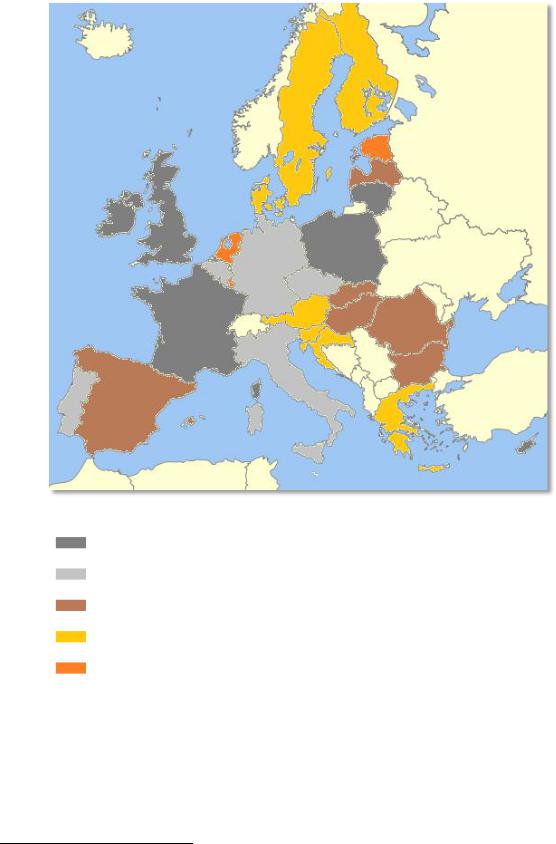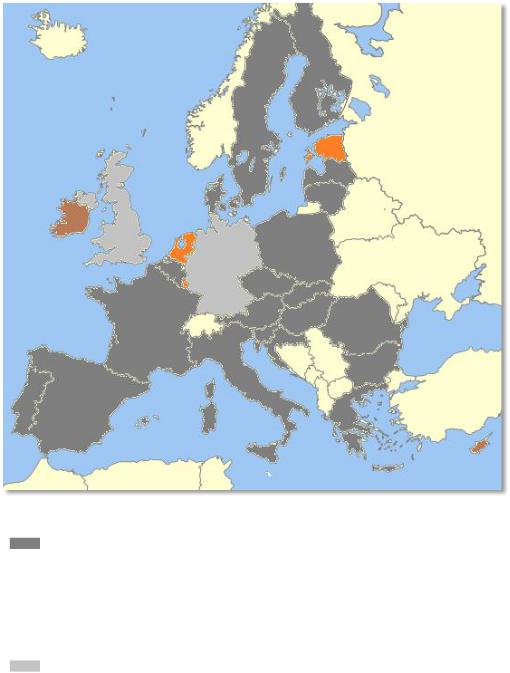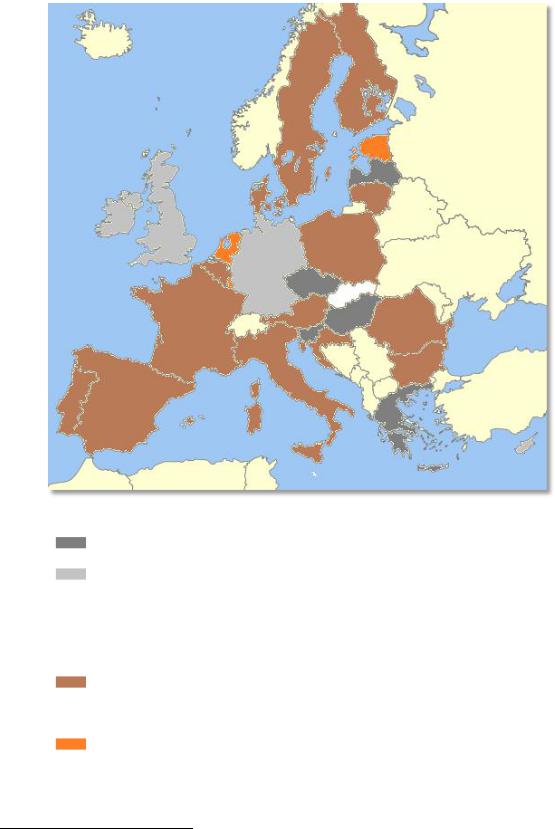
- •1. Introduction
- •2. Duty of care
- •2.1. Regulatory structure
- •2.2. Behavioural expectations
- •2.3. Business judgment rule
- •3. Duty of loyalty
- •3.1. Regulatory structure
- •3.2. Related party transactions
- •3.3. Corporate opportunities
- •4. Enforcement
- •4.1. Derivative action
- •4.2. Ease of enforcement
- •5. Directors’ duties in the vicinity of insolvency
- •5.1. Duty to file and wrongful trading
- •5.2. Changes to the core duties owed by directors
- •5.3. The “re-capitalise or liquidate” rule
- •5.4. Additional elements of a regulatory response to near-insolvent trading
- •6. Conclusion

4.Enforcement
In order to ensure effective investor protection, the enforcement of directors’ duties is a necessary complement to the substantive rules on directors’ duties and liability. Enforcement of directors’ duties can take different forms. First, the breach of duty gives rise to a civil liability claim of the company against the director, which may be enforced either by the authorised corporate organ, in general the board of directors in one-tier systems and the supervisory board in two-tier systems, or by minority shareholders by way of a derivative action. Second, as an alternative (or complement) to private enforcement, some legal systems provide for public investigation procedures, which may lead to the imposition of administrative sanctions or orders that interfere with the governance of the company.86 Finally, in cases of serious breaches, criminal sanctions apply. The three strategies operate to some extent as functionally substitutes, i.e. deficiencies with respect to private enforcement may be compensated for by effective public enforcement.87
Given that the enforcement of directors’ duties by the authorised organ of the company is rare and generally presupposes a change in management, enforcement by minority shareholders through a derivative action is of central importance. We will focus in the following sections on this strategy in order to assess the level of shareholder protection in the EU. We analyse the ease with which shareholders can bring a minority action along three dimensions that are, arguably, of equal importance in assessing the effectiveness of the minority shareholder suit: standing requirements, conditions for bringing the action, and cost rules.88 Standing rules specify whether anyone holding at
86Two practically relevant examples of public enforcement are the Dutch inquiry proceedings and directors’ disqualification, which is available in many legal systems and plays an important role for example in the UK and Ireland. Under the Dutch inquiry proceedings, regulated in the Dutch Civil Code, ss. 2:344-2:359, the Enterprise Chamber of the Amsterdam Court of Appeal appoints, upon the application of, among others, shareholders holding at least 10% of the capital or a nominal value of EUR 250,000, an investigator to conduct an inquiry into the policy and conduct of the business of the company. The court may order the suspension of directors, appointment of supervisory directors with special powers, suspension of resolutions of the management board or suspension of voting rights. Similarly, in a number of Member States minority shareholders holding between 1% and 10% of the share capital may request the court to appoint a special investigator who examines the conduct of the members of the company’s management bodies (see, e.g.,
Austrian Stock Corporation Act, § 130(2) (10% if facts indicate a material violation of the law or the articles
(‘grobe Verletzungen des Gesetzes oder der Satzung’)); German Stock Corporation Act, § 140(2) (1%, with the same proviso as under Austrian law); Lithuanian Civil Code, Art. 2.124 (10%)). Disqualification of directors in the UK and Ireland requires, among other reasons, that the conduct of the director ‘makes him unfit to be concerned in the management of a company’, UK Company Directors Disqualification Act 1986, ss. 6(1), 8(2);
Irish Companies Act 1990, s. 160(2)(d). In addition to disqualifications, Irish company law also contains a restrictions regime, i.e. the possibility to apply for a court order prohibiting directors of insolvent companies from acting as director of another company for a period of five years, unless the court is satisfied that the director ‘has acted honestly and responsibly in relation to the conduct of the affairs of the company’ (with the burden of proof resting on the director) or the company meets heightened capital requirements, see Irish Companies Act 1990, s. 150.
87For example, the Dutch inquiry proceedings compensate to some extent for the lack of a derivative action mechanism in the Netherlands, and the UK and Irish directors’ disqualification mechanisms attenuate the negative consequences of the restrictive conditions of Foss v Harbottle (now superseded by a statutory derivative action mechanism in the UK, but still in force in Ireland).
88See also Maertin Gelter, Why do Shareholder Derivative Suits Remain Rare in Continental Europe?, 37 Brooklyn Journal of International Law 843, 856-880 (2012) (arguing that four preconditions have to be satisfied for the derivative action to be an efficient shareholder protection tool: standing requirements must be favourable and not include a minimum ownership threshold, the claimant must not bear the litigation risk, access of the shareholders to information must be secured, and it must be possible to include controlling shareholders as potential defendants).
21
ElectronicElectroniccopycopy availableavailable at:at: https://ssrnhttps://ssrn.com/abstract=2249050.com/abstract=2249050

least one share can file a derivative action or the claimants must satisfy a holding threshold expressed in percentage terms or as a minimum nominal value amount. Further conditions that must be satisfied to bring an action may relate to minimum holding periods, the requirement that the claimants have deposited their shares with the central depository, or, more restrictively, that the defendant director is in control of the general meeting.89 Cost rules, i.e. procedural rules determining whether the company or the claimants bear the costs of the proceedings and, if the latter is the case, whether the claimants can obtain reimbursement from the company, are important because enforcement through minority shareholders faces collective action and free-rider problems. Enforcing the company’s claim leads to a recovery by the company. The payoff of successful enforcement therefore accrues to all shareholders in proportion to their shareholdings, which leads to sub-optimal incentives for shareholders to bring a derivative action if they have to bear the costs of the proceedings.90
4.1. Derivative action
We summarise the operation of the minority shareholder suit in the Member States along the abovementioned three dimensions in the following maps. We classify all Member States, except Estonia, Luxembourg, and the Netherlands, where no derivative action exists, and Malta, where it plays only a marginal role in practice.91 The figures below are based on the public, stock exchange listed company. In private companies, the requirements for bringing a derivative action may be different; for example, the threshold for standing may be higher.92 Map 4 depicts the standing requirements, Map 5 further conditions for bringing a minority action, and Map 6 the cost rules.
89This is the famous rule in Foss v Harbottle (1843) 67 ER 189: the defendant directors must have committed a wrong that benefitted them personally, i.e. they committed a fraud, and they must have de jure or de facto control of the general meeting.
90For this reason, the derivative action may be qualified as a public good, see Anne van Aaken, Shareholder Suits as a Technique of Internalization and Control of Management. A Functional and Comparative Analysis,
68RabelsZ 288 (2004).
91In theory, the English common law (the rule in Foss v Harbottle) should apply Malta, but due to the scarcity of case law it is difficult to assess in which form the English rules would be transposed into the Maltese legal system. In practice, minority shareholders tend to rely on the unfair prejudice remedy pursuant to Art. 402 of the Maltese Companies Act, which is, however, more limited in its scope of application since it requires that the company’s affairs have been conducted in a manner that is ‘oppressive, unfairly discriminatory against, or unfairly prejudicial to, a member’.
92For example, in Italy the threshold for non-listed, closely held companies is 20%, see Civil Code, Art. 2393bis. For an analysis of the Italian derivative action mechanism see Marco Ventoruzzo, Experiments in Comparative Corporate Law: The Recent Italian Reform and the Dubious Virtues of a Market for Rules in the Absence of Effective Regulatory Competition, 40 Texas Int’l L. J. 113, 140-142 (2004) (pointing out that in listed companies the derivative action had not been used a single time in six years since its reform in 1998, and mentioning as possible reasons the misaligned incentives because minority shareholders bear the financial risk of the litigation (see also supra n 90 and accompanying text), the absence of class actions, contingency fees, and party-controlled discovery, and the significant length of civil law suits in Italy, which is well above the European average).
22
ElectronicElectroniccopycopy availableavailable at:at: https://ssrnhttps://ssrn.com/abstract=2249050.com/abstract=2249050

Map 4: Derivative action – standing
Legend93 |
Country |
1 share |
CY, FR, IE, LT, PL, UK |
|
|
> 1 share, but < 5% |
BE, CZ, DE, IT, PT |
|
|
5% to ≤ 10% |
BG, HU, LV, RO, SK, ES |
|
|
10% or more |
AT, HR, DK, FI, EL, SI, SE |
|
|
No derivative action |
EE, LU, NL |
|
|
93 Percentages refer to the required proportion of the registered share capital that the claimants must hold in aggregate. Legal systems generally also provide for a minimum amount in absolute terms, which is here omitted.
23
ElectronicElectroniccopycopy availableavailable at:at: https://ssrnhttps://ssrn.com/abstract=2249050.com/abstract=2249050

Map 5: Conditions for bringing a derivative action
|
Legend |
Country |
|
|
No further conditions (except |
AT, BE, BG, HR, CZ, DK, FI, FR, EL, HU, |
|
|
possibly a minimum period of time |
IT, LV, LT, PL, PT, RO, SK, SI, ES, SE |
|
|
during which the shareholder must |
|
|
|
have held the shares, or the |
|
|
|
responsible organ, e.g. general |
|
|
|
meeting or supervisory board, must |
|
|
|
have decided not to pursue the |
|
|
|
action) |
|
|
|
Claim admission procedure: The |
DE, UK |
|
|
court has to grant permission for |
|
|
|
the claim to continue and considers |
|
|
|
a number of criteria to balance the |
|
|
|
interest of the shareholder(s) in |
|
|
|
bringing the action and the interest |
|
|
|
of the company not to engage in |
|
|
|
litigation94 |
|
|
|
|
|
|
94 These criteria typically include the disruptive effect of the litigation on the company’s operations, damage to the reputation of the company, the severity of the alleged breach, and the good faith of the parties involved in the proceedings. It should be noted, however, that substantial differences exist between the German and the UK claim admission procedures. The German procedure is structured in a way that refusal by the court to grant permission is the exception if the other requirements of the law are satisfied (the claimants must have been shareholders at the time they learned about the alleged breach of duty; they requested the company to instigate proceedings, and the company failed to do so within a reasonable time; and the claimants present a prima facie
24
ElectronicElectroniccopycopy availableavailable at:at: https://ssrnhttps://ssrn.com/abstract=2249050.com/abstract=2249050

The shareholders can only bring |
CY, IE |
the derivative action if restrictive |
|
requirements are satisfied (for |
|
example, following Foss v |
|
Harbottle, derivative actions are |
|
only possible if the directors have |
|
committed a wrong that benefitted |
|
them personally, i.e. they |
|
committed a fraud, and they have |
|
de jure or de facto control of the |
|
general meeting95) |
|
Not applicable because no |
EE, LU, NL |
derivative action |
|
case that the loss suffered by the company is due to dishonesty or gross violation of legal provisions or the articles, German Stock Corporation Act, s. 148(1)). The limited discretion of the courts can be derived from the formulation of the statute: The courts shall reject the application only if enforcement of the claim is ‘outweighed by the interests of the company’ (ibid). In contrast, UK courts enjoy a wider discretion. If one of the grounds of a mandatory refusal to grant permission is not present, the courts shall, in considering whether to give permission, ‘take into account’ a number of factors listed non-exhaustively in the Companies Act, for example the good faith of the claimant or the importance that a director acting in good faith would attach to continuing the claim, Companies Act 2006, s. 263(2), (3).
95 This rule makes derivative actions for negligence or in widely held companies effectively impossible.
25
ElectronicElectroniccopycopy availableavailable at:at: https://ssrnhttps://ssrn.com/abstract=2249050.com/abstract=2249050

Map 6: Derivative action – cost rules
Legend |
Country |
The company pays all costs |
CZ, EL, HU, LV, SI |
|
|
The shareholder has to advance |
CY, DE,96 IE, UK |
some costs (for example those of |
|
the admission procedure, if any), |
|
but can claim reimbursement from |
|
the company under some |
|
conditions without bearing the |
|
litigation risk |
|
The shareholder pays and bears the |
AT, BE, BG, HR, DK, FI, FR, IT, LT, PL, |
litigation risk; or the company pays |
PT, RO, SK, ES, SE |
but can reclaim the costs from the |
|
shareholder |
|
Not applicable because no |
EE, LU, NL |
derivative action |
|
96 In Germany, the claimant has to bear the costs of the admission procedure if the application is dismissed, unless the dismissal is due to facts relating to the interest of the company that the company could have disclosed prior to the application, but did not disclose. If the application is successful, but the claim is dismissed in whole or in part, the company shall reimburse the claimant, s. 148(6) Stock Corporation Act.
26
ElectronicElectroniccopycopy availableavailable at:at: https://ssrnhttps://ssrn.com/abstract=2249050.com/abstract=2249050
